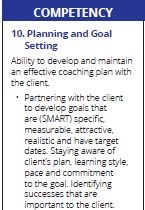The question “anything else?” invites a yes or no answer. The question “what else?” invites consideration of additional possibilities. When a coach asks closed-ended questions, they limit client thinking by either stopping additional consideration or indicating that other thoughts might best be saved for later. With open-ended questions the coach empowers the client to explore, consider possibilities, and make their own choices.
Imagine a conversation between a coach and a client where the client states, “I am overwhelmed.” A follow-up question might be, “Are you worried that you are unable to handle the load?” This interprets what is behind the initial statement and includes some judgment. It may throw a client off-track because they do not understand the question. A well-trained coach will instead say something like, “Tell me more.” The client then continues their thought process and shares what is happening. Overwhelmed could be overwhelmed with joy, concern, gratitude, tasks, priorities, etc. The first example of a response jumps to a conclusion, the second seeks clarification.
In a quality training program, coaches learn how to ask questions so that the client is empowered to think, consider different perspectives, and choose their own course of action. A skilled coach starts with the premise that the client is their own best expert.



